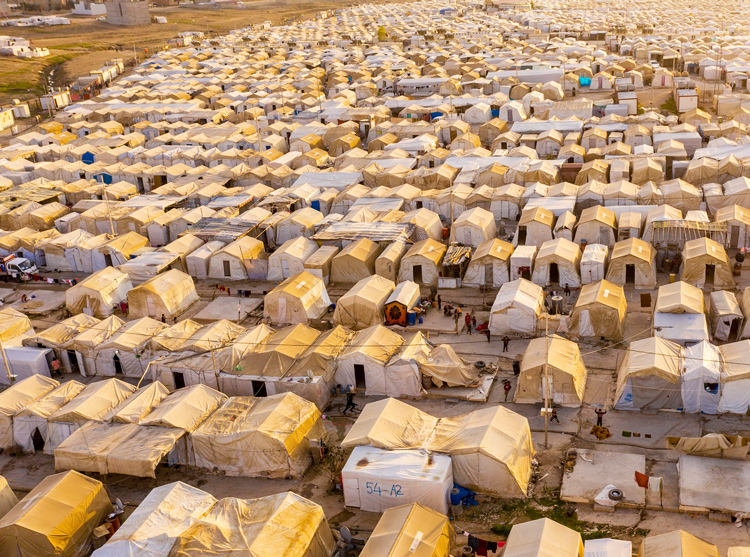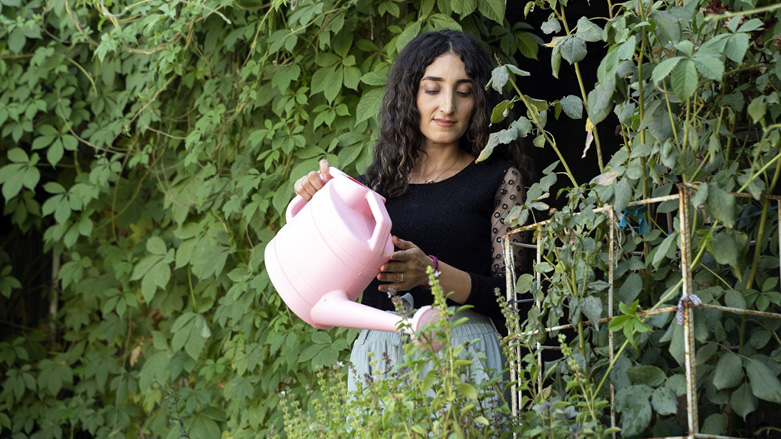Yazidi genocide is ongoingIn-depth: Eight years after the genocide by the Islamic State, Yazidi survivors remain stranded in camps with little hope of returning to their homeland. With many emigrating in search of stability, the community faces an existential threatIn a ramshackle café, darkened by tarpaulins to keep out the hot August sun, a man is speaking on the phone with a smuggler who will help him and his family reach Germany. It has been eight years since he fled the Yazidi homeland in north-western Iraq for a displacement camp in the foothills of the Zagros Mountains.
Now Sameer, 32, echoes a common refrain in the camp: “In Iraq there is no hope, there is no future; we give up.”
The Yazidis here are the survivors of a genocide. In August 2014, the Islamic State (IS) group ripped through their towns and villages, systematically killing men and older boys and enslaving women and children. More than 10,000 people were kidnapped or murdered. At least 2,700 Yazidis remain missing to this day, either dead or still in IS captivity.
Virtually all who escaped were displaced – about 400,000 people. Eight years on, close to half of them are still living in 15 internally displaced persons (IDP) camps scattered across the plateaus and dry mountains of the Kurdistan region of Iraq.
With their homeland still in ruins and unsafe for return, pervasive hopelessness is driving emigration to Europe. Yazidi activists say emigration – and indefinite exile in camps – is effectively a slow continuation of the genocide to eradicate the Yazidi population in Iraq.
"Yazidi activists say emigration – and indefinite exile in camps – is effectively a slow continuation of the genocide to eradicate the Yazidi population in Iraq"Khodeda Qolo Edo’s home is a white caravan with a front terrace sheltered by sturdy tarpaulins, typical of many homes in the Dawodia IDP camp. Morning glory vines travel up the sides and outside the sky is a brilliant blue.
“When someone like you comes to my house, I feel shy,” Edo, 42, told The New Arab, as his wife and children gathered around.
“When we lived in Sinjar, it was good for us economically. We had a house and were doing very well; in one hour, we left all this behind and came here.”
He said the family has given up hope of returning to their village in Sinjar, the Yazidi homeland: “It’s not safe…Maybe this war will happen again.”
Last year two of his cousins travelled into the EU through Belarus and Poland, a migration route that garnered intense political attention and was soon shut down. The family would like to leave as well, but they cannot afford to travel all at once and don’t want to split up; sometimes family reunification can take years.
Down the street, another family gathers under a tree and recounts how they fled the small town of Gerzehri in the middle of the night, leaving everything behind. Two relatives were killed.
“We have nothing in our minds to give hope,” said Jafer, 50, of their life now. “We only have routine.”
Some people in the camp work as day labourers on nearby farms, or in the army of the Kurdistan Regional Government, but wages are low. The family’s two sons study, but jobs matching qualifications are hard to come by.
Jafer’s 23-year-old son wants to travel to Europe. “Nothing is good in Iraq,” he said.
During the conflict with ISIS in Iraq between 2014 and 2017, over 6 million people were internally displaced. Most have since gone home, but not the Yazidis. The heartland of the small religious minority, Sinjar, has the lowest return rates in the country, with just 36% of the original population returning, according to data from the International Organization for Migration (IOM).
A politically contested region, Sinjar remains unsafe and unstable. Infrastructure still lies in ruins, and resulting challenges in accessing running water, electricity, health care and education impede the ability of people to return and flourish. The IOM found that 99% of people who have moved back to the district live in areas where under half of the residents can find employment. In recent years, a rise in Turkish airstrikes against the Kurdistan Workers’ Party (PKK) and purportedly affiliated groups has slowed returns to a trickle.
Essian IDP camp sits among low rolling hills that in late August are parched, leaving only pale grasses and red dust. The streets are empty, the camp’s nearly 13,000 inhabitants remaining inside to avoid the worst of the heat, which by noon has climbed to 44 degrees Celsius. Eight years in, they still live in plastic tents.
A team of psychologists and support staff is setting up a new project centre in the camp. They’re repurposing two caravans abandoned by long-gone aid organisations. Stickers from the United Nations Refugee Agency, UNHCR, are plastered along the side of one; down the street, frayed USAID tarpaulins cover impromptu pens caging goats and chickens.
Lena Schmid, a psychologist and co-founder of the German organisation Hudara, which leads the programme together with Duhok-based NGO Rusaz, says displacement tends to exacerbate existing mental health conditions and can contribute to new ones, such as depression and anxiety-related disorders. Nearly everyone experiences chronically elevated levels of psychosocial stress.
"Like other minority religious groups in Iraq, the emigration of the ancient Yazidi community poses an existential threat"
“The lack of future prospects, loss of social structures and communities, and missing people with fading hope of seeing their loved ones again, combined with increasing poverty and unemployment have far-reaching effects on health and well-being,” said Schmid.
For those who can afford it, and who succeed, emigration promises a way out.
This summer has seen a surge in Yazidis travelling through Turkey and into Greece.
About 4,300 left Iraq in one month between August and September, according to the Alind Organization for Youth Democratisation, which bases its data on information from transport offices, people smugglers, and organisations working in camps.
The organisation, based in Duhok, Kurdistan region of Iraq, carries out a regular survey among displaced Yazidis, and has noticed a growing share wanting to leave the country. 83% indicated they wanted to emigrate during the latest round.
Sherzad Permosa, Alind’s director, explained that just the day before speaking with The New Arab he received news of 250 Yazidis travelling by bus into Turkey. Kurdish media airs footage of packed passport application offices, and young Yazidi men and families boarding outbound buses.
Earlier this month, 120 Yazidis were stranded outside a camp in northern Greece which had reached capacity, according to media reports.
The emigration of young men raises additional concerns for the community in Iraq due to rules which not only prohibit marriage outside of the Yazidi religion, but also restrict it to within particular “castes” or groups.
“Because most of the emigrants are males, the young women may struggle to marry,” said Permosa.
Like other minority religious groups in Iraq, the emigration of the ancient Yazidi community poses an existential threat. The most sacred site of the religion, Lalish, is tucked in the hills near Duhok; Yazidis have been worshipping here for over
4,000 years.
Perwin Thasenmho, 16, her parents and sisters at their home in an IDP camp. Perwin’s aunt remarked: “We are sad that the young people leave the camp and go to Europe. I don’t like it because the Yazidis will be few, and the boys will be few and there will not be enough for the girls to marry!” [TNA/Tara Brian]
While smaller numbers of Yazidis live in Syria, the Caucasus, and more recent diaspora communities in Europe and North America, Iraq is the heartland of the religion.
Since 2014, as many as half of the pre-genocide Yazidi population of Iraq has emigrated, according to some estimates. However, no official figures exist.
“This is the worst thing, that the Yazidi people leave Yazidi places because this is exactly what Daesh [IS] wanted,” said Zemfira Dlovani, Chairwomen of the Central Council of Yazidis in Germany, the country with the largest Yazidi population outside Iraq. “It’s nothing else but the fulfilment of the genocide, in the end.”
The Council is working to build political support in Iraq and in Germany towards rebuilding and stabilising Sinjar so people can move home. A strong Yazidi civil society movement in Iraq and Germany has been active in fighting for reconstruction, justice and reparations for survivors of IS crimes, but political deadlock over Sinjar remains.
"'I remember my grandfather used to say, ‘things will be ok, just wait.’ I used to say this to my sons too. But it’s not ok anymore'"
“It’s quite unfortunate that the Yazidis, which are our neighbours…they will become very few in Iraq just like us,” said Wansa Shamoon, from the Jiyan Foundation for Human Rights in Duhok, which promotes the mental well-being, physical rehabilitation, and social reintegration of survivors and their families.
She herself is a Christian whose family also fled IS in 2014. Not only IS, but recurrent violence and pervasive discrimination have pushed a dramatic emigration of Christians out of Iraq in the past two decades.
The decline of both the Christian and Yazidi communities follows a pattern of minority expulsion. In the 1940s and 50s nearly all Iraq’s Jewish population left the country.
“My grandmother was always saying: ‘the Jewish told us when they left Iraq, Sunday is just after Saturday,’” Shamoon recounts.
She believes the Christians and Yazidis share a mutual story in many ways, both enduring repeated genocides over the generations, both ancient religions born in the region and faced with losing their roots.
“[Iraq] is their country, it’s their soul, it’s everything culturally, emotionally connected to them, but they have to choose between having safety without home, or living in your home while it’s not safe.”
I can feel them,” she said, about the choice to stay or go. “I also have not decided yet.”
For Sameer, the Yazidi father in the IDP camp, the decision has been made: “I remember my grandfather used to say, ‘things will be ok, just wait.’ I used to say this to my sons too. But it’s not ok anymore.”
Tara Brian is a freelance journalist. She previously worked as a researcher with the United Nations' migration agency.
Follow her on Twitter: @trbrian11
https://english.alaraby.co.uk/analysis/iraqs-displaced-yazidis-genocide-ongoing
























